Woman Asks For Advice On How To Handle A Lady With Special Needs Who Is Obsessed With Her Dog
Sometimes, it can be hard to navigate the best way to interact with someone who may have special needs or be intellectually challenged. We always mean well and aspire to be kind, but when boundaries are crossed, it can become difficult.
Reddit user u/Correct-Painting-612 recently shared a story on this topic in the AITA (Am I The A**hole?) subreddit. She explained that there is a woman who lives in her neighborhood and has special needs.
The woman is unable to drive, so she walks everywhere and is often seen around town. The OP says she first encountered the lady a few years ago while they were both walking their dogs.
The lady fell in love with one of OP's three dogs, so from then on, whenever they would run into each other, the lady would be excited to see the dog. After the lady's own dog passed away, OP says she didn't see her as much walking around town, and OP's dog was getting older, so he wasn't going out for walks as often.
The Reddit user began to notice the woman walking by her house sometimes, so she would say hello, and if time permitted, she would bring the dog out to say hello to the lady. However, a year ago, OP noticed the lady in her driveway talking to the dog over the fence, which made her feel a little uneasy.
About six months later, OP says her family was having dinner when the lady appeared again on the other side of their fence, and she wouldn't go away until they brought the dog out to say hi.
OP says she feels uncomfortable about the lady showing up at her home that way, so she asked the Reddit community for advice on how to address it. Keep scrolling to find out how people reacted.
The OP shared a story about a woman with special needs who lives in her neighborhood.

The Reddit user began to notice the woman walking by her house sometimes, so she would say hello, and if time permitted, she would bring the dog out to say hello to the lady.
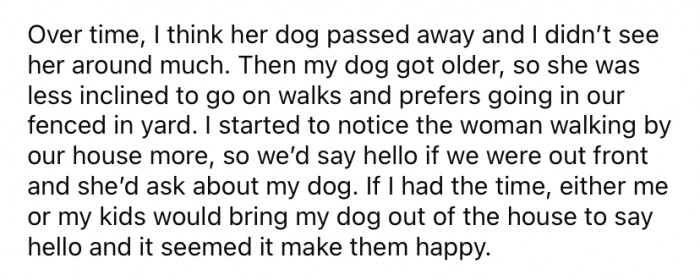
But a year ago, OP noticed the lady in her driveway talking to the dog over the fence, which made her feel a little uneasy.

Understanding Boundaries in Caregiving
Dr. Jennifer Lee, a psychologist specializing in caregiving dynamics, explains that while caring for others is essential, it's crucial to maintain boundaries to avoid emotional burnout.
Her research indicates that caregivers often struggle with setting limits, which can lead to feelings of resentment and exhaustion.
Understanding the importance of boundaries is crucial for anyone in caregiving roles to ensure their own well-being.
The Complexity of Caring for Others
Caring for individuals with special needs can often lead to complex emotional dynamics. According to Dr. Susan H. McDaniel, a professor of psychiatry at the University of Rochester, caregivers often experience increased stress and emotional strain when boundaries are not clearly defined.
In this case, the woman's struggle with a lady's obsession with her dog reflects the delicate balance between kindness and self-preservation.
OP says she feels uncomfortable about the lady showing up at her home that way, so she asked the Reddit community for advice on how to address it.

Here's how people reacted.

This is a tough one.

Behavioral psychologists note that crossing boundaries can often stem from a desire to be helpful, but it can lead to unintended consequences.
Studies show that when caregivers neglect their own needs, it can create a cycle of dependency that ultimately hinders the individual they are trying to help.
Recognizing this pattern is essential for both caregivers and those they assist.
Research indicates that caregivers who lack boundaries can experience burnout and compassion fatigue. A study published in the Journal of Clinical Psychology found that caregivers who practice self-care and set clear emotional limits report better mental health outcomes.
This underscores the importance of maintaining personal space and boundaries, even in situations that call for empathy.
Where is her caregiver?

"Set up a specific time for her to visit the dog instead."
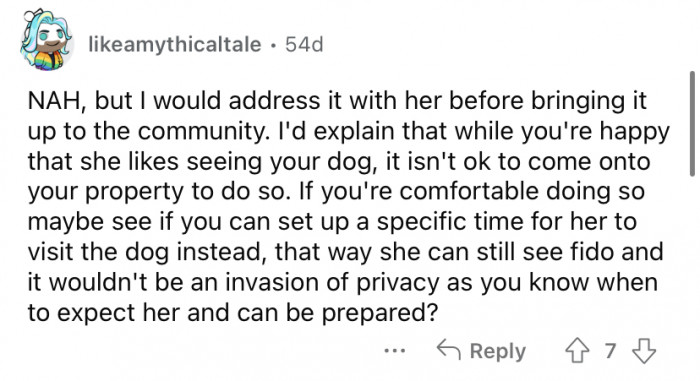
"Your concerns are valid and important."
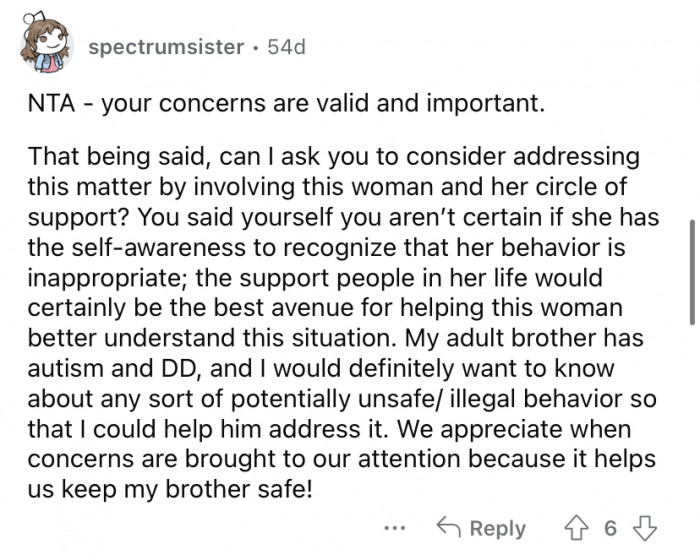
The Importance of Self-Care
Engaging in self-care is a vital aspect of maintaining healthy boundaries in caregiving relationships.
Research published in the Journal of Health Psychology indicates that caregivers who prioritize their own well-being report higher levels of satisfaction and effectiveness in their roles.
Encouraging caregivers to take time for themselves can ultimately lead to better outcomes for those they support.
Understanding the Need for Boundaries
Setting boundaries is not only healthy but necessary for maintaining relationships. Dr. Henry Cloud emphasizes that boundaries allow individuals to define their emotional space, which is crucial for healthy interactions.
In cases where caring for others begins to infringe on one's personal well-being, establishing limits becomes imperative.
"She seems very unaware of the social norms."
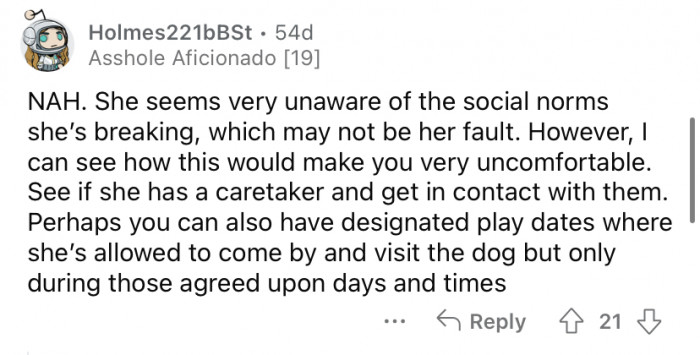
Boundaries are hard, but necessary.
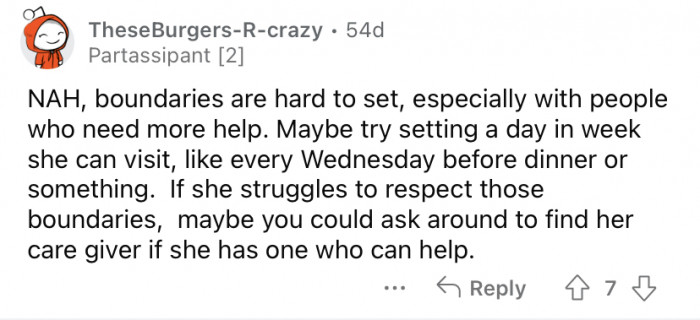
Is it really that bad?

Psychologists emphasize the need for caregivers to communicate their limits clearly to those they are caring for.
Effective communication about boundaries helps to set realistic expectations and fosters understanding from others.
Studies indicate that when caregivers articulate their needs, it can enhance their relationships and reduce feelings of guilt associated with self-care.
Moreover, the concept of emotional intelligence plays a significant role in boundary-setting. Dr. Daniel Goleman's research shows that individuals with high emotional intelligence are better equipped to navigate complex relational dynamics by recognizing their own needs and those of others.
This skill is essential for caregivers to balance compassion with self-care.
"Communicate with her first."

"It doesn't sound like she means any harm."
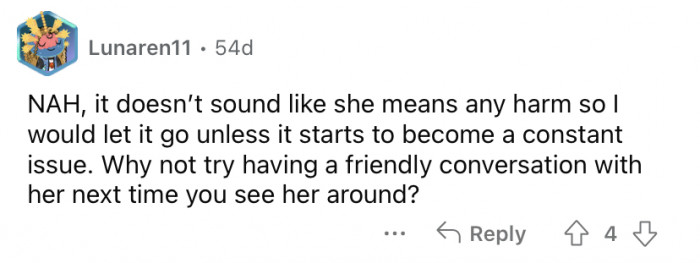
"A difficult situation."
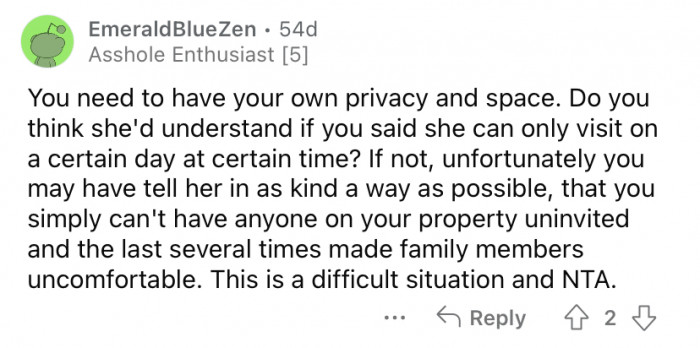
Navigating Emotional Attachments
In caregiving situations, emotional attachments can complicate boundary-setting.
Research shows that strong emotional bonds can make it challenging for caregivers to maintain the necessary distance to protect their own mental health.
Understanding these dynamics is crucial for caregivers to navigate their roles effectively.
Practical Steps for Boundary Setting
To establish boundaries effectively, individuals can start by identifying their emotional triggers. Dr. Brené Brown suggests using self-reflection to understand what behaviors are acceptable and what are not.
Creating a personal boundary plan can help individuals articulate their limits clearly to others, ensuring that their needs are respected.
"It's hardly a current issue."
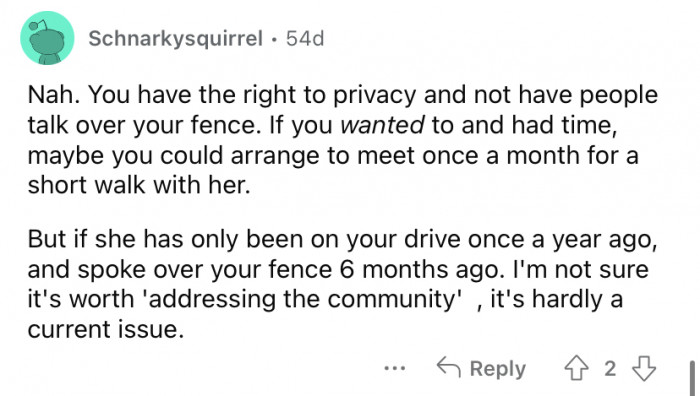
Doggy dates?

"You have a right to your privacy."
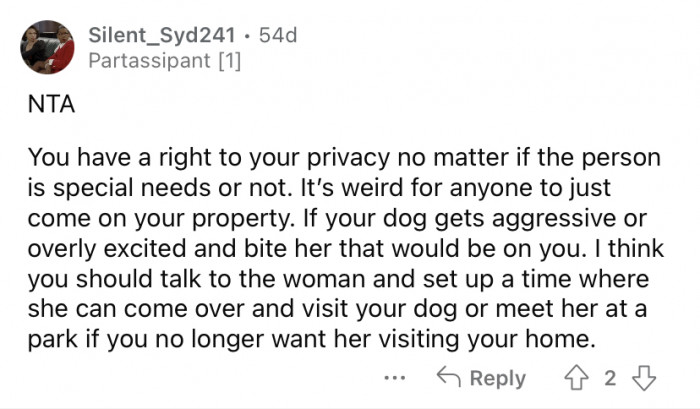
Psychologists recommend establishing boundaries in a way that acknowledges emotional connections while still protecting one's well-being.
Finding this balance allows caregivers to provide support without compromising their own mental health.
Ultimately, it’s about fostering a sustainable relationship that benefits both parties involved.
Additionally, practicing assertive communication is crucial. Research shows that those who express their needs clearly and respectfully tend to have healthier relationships. Utilizing 'I' statements can help convey feelings without placing blame, fostering more constructive dialogues.
Ultimately, maintaining boundaries is essential for both personal well-being and healthy interactions.
Creepy!

"Be nice, but direct."
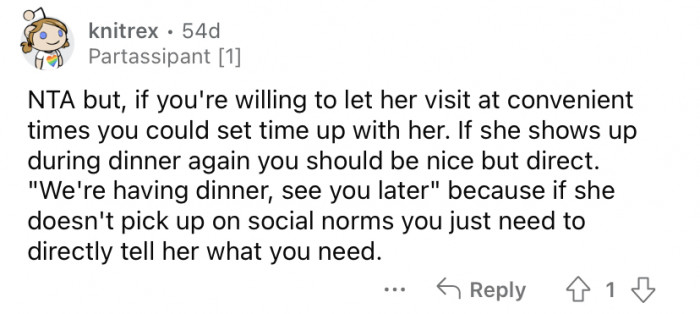
"She is absolutely no threat of any kind."
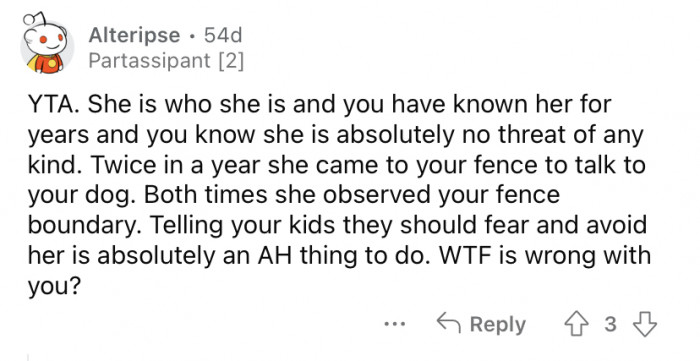
Ultimately, maintaining boundaries in caregiving relationships is an ongoing process that requires self-awareness and communication.
By prioritizing their own needs and setting clear limits, caregivers can enhance their effectiveness and overall satisfaction in their roles.
It’s about creating a healthy dynamic where both the caregiver and the recipient can thrive.
"An unhealthy attachment."
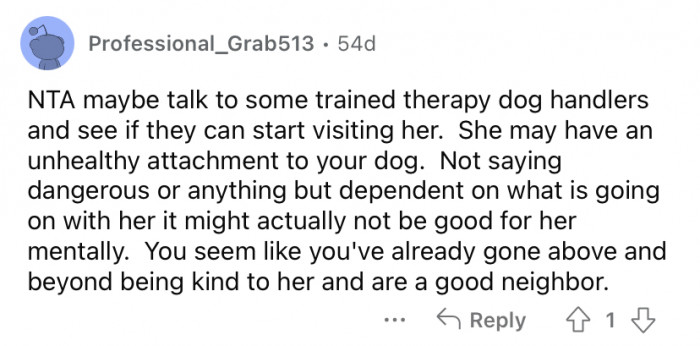
NTA.

What's your take on this situation? Do you think the OP is overreacting about this, or is it valid for her to be concerned?
Either way, kindness is always the best policy. Perhaps she could allow the lady to see her dog at designated times, as some members of the Reddit community suggested.
We would love to hear your opinions on this. You can share your thoughts with us in the comment section.
Psychological Analysis
This situation highlights the emotional complexities faced by caregivers. It's crucial for individuals to recognize their limits and establish boundaries that protect their well-being while providing support to others.
Encouraging open communication about needs can significantly enhance relationships in challenging caregiving scenarios.
Analysis generated by AI
Analysis & Alternative Approaches
In summary, navigating relationships with individuals who have special needs requires a delicate balance of empathy and self-care. Establishing clear boundaries is essential for caregivers to maintain their emotional health while providing support.
Through self-reflection and assertive communication, individuals can foster healthier dynamics that honor both their needs and those of others.
Analysis & Alternative Approaches
Research consistently highlights the importance of boundaries in caregiving relationships.
According to the American Psychological Association, understanding and communicating boundaries can significantly impact the well-being of both caregivers and those they assist.
With commitment and self-awareness, caregivers can foster healthier dynamics that benefit everyone involved.



